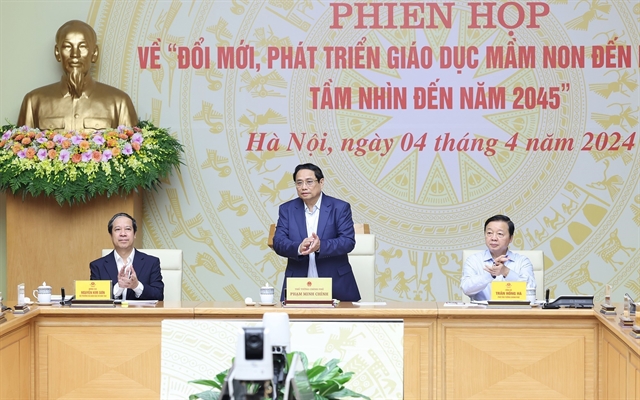 Politics & Law
Politics & Law

 |
| Prime Minister Phạm Minh Chính chairs a meeting of the committee on Renewal and development of early childhood education by 2030, a vision towards 2045, on Thursday morning in Hà Nội. — VNA/VNS Photo Dương Giang |
HÀ NỘI — Prime Minister Phạm Minh Chính has told relevant ministries to review and establish policies to mobilise all resources for early childhood education, especially policies regarding taxation, land access, credit and human resources, as well as enhancing the quality of human resources, to serve early childhood education.
He made the order when he chaired a meeting of the committee on renewal and development of early childhood education by 2030 on Thursday in Hà Nội.
The relevant ministries, sectors and localities were ordered to coordinate with the Ministry of Education and Training to implement the above requirements, he said.
Speaking at the meeting, he also said that education and training were identified by the Party and the State as the top national policies.
He quoted President Hồ Chí Minh’s teaching: “For the sake of ten years, we must plant trees, for the sake of 100 years, we must cultivate people.”
He added that investing in education was investing in development.
There must be fundamental and comprehensive reforms in education and training, including early childhood education, to realise the Party and the State's guidelines and policies on education and training development, in line with the requirements of industrialisation and modernisation of the country.
The renewal of education and training must aim to comprehensively train and develop Vietnamese people, in line with the development trends of the era, adapting to the country's conditions and circumstances.
It also aims to innovate early childhood education, particularly for children aged three to five; and innovate resource mobilisation, with public-private cooperation being the main method to develop education and training, he said.
Also at the meeting, participants said that early childhood education played a particularly important role in the national education system and in the strategic development of human resources and the development of Vietnamese people.
In recent years, the Party and the State have issued many guidelines and policies on education and training development, including early childhood education.
Therefore, early childhood education had achieved commendable results.
Every year, over 5.3 million preschool children are nurtured, cared for and educated in over 15,000 preschools and nearly 16,000 independent facilities nationwide. Nationally, 56.9 per cent of preschools meet national standards.
Successfully achieving the goal of universalising early childhood education for 5-year-old kindergarten children had created mechanisms and motivations to promote the development of early childhood education, step by step meeting the needs of nurturing, caring for and educating children.
However, there was still a shortage of classrooms, teachers and teaching equipment, the meeting heard.
In response to the country's development needs in the new period, early childhood education should be renewed to meet the requirements.
The goal was to innovate the content of early childhood education programmes; especially the mechanisms for mobilising resources and the conditions for implementing innovation and development in early childhood education.
Chính assigned the Ministry of Education and Training to absorb the comments of the Committee’s members; continue to improve reports and submit them to competent authorities to issue appropriate documents on the renewal and development of early childhood education in accordance with the Party's and the State's guidelines, based on the actual situation and overcoming bottlenecks in the development of early childhood education. — VNS




